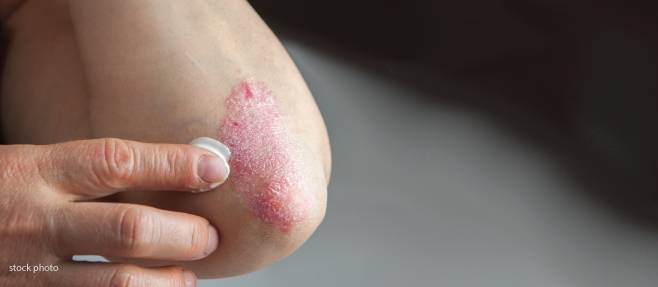Today’s Best Psoriasis Treatment Options

Psoriasis, a common skin condition that is chronic and sometimes painful, is an chronic disease. However, there are things that sufferers can do to minimize psoriasis symptoms.
The following treatment options can minimize symptoms of moderate to severe psoriasis.
Topical Treatments
Topical products are applied directly onto affected areas of the skin to bring local relief. Common active ingredients of topical medications include:
Steroids: Steroid-based topical products are one of the most effective topical options. Steroids can work to relieve itching and inflammation while halting the overproduction of excess skin cells. Steroid topical products can be prescribed in different strengths and formulations (creams, ointments, solutions, foams). The downside of steroids is that they may cause side effects, so always follow instructions provided by your physician.
Retinoids: Prescription strength retinoids contain a synthetic form of vitamin A that can improve psoriasis over time. Retinoids, while not as strong as steroids, can provide good results with less chance of unwanted side effects.
Calcipotriene: Calcipotriene-based topical products, a synthetic vitamin D, can help minimize psoriasis by slowing cellular growth, removing scales, and flattening lesions. Calcipotriene is particularly effective when combined with a topical corticosteroid.
Coal-tar: Coal-tar products (either ointment or shampoo) have been shown to decrease the rapid growth of skin cells on the skin and scalp.
Salicylic Acid: While their efficacy is relatively modest, topical treatments containing salicylic acid can help strip psoriatic scales. This option is ideal in limited cases as using too much can lead to irritation.
Systemic Medications
Systemic medications can be prescribed to treat moderate to severe psoriasis that is unresponsive to other treatments. Medications like acitretin, methotrexate, cyclosporine, or biologics (e.g. Enbrel, Humira, Stelara, Cosentyx, Taltz) work by targeting a portion of the immune system that causes psoriasis. Systemic drugs are administered orally (through liquid or pill form) or injected.
While these oral medications are powerful and effective, they can cause a wide range of side effects. Always follow instructions provided by your physician.
Biologics
Various biologic drugs, commonly referred to as biologics, may be prescribed to treat more severe forms of psoriasis. Biologics are either injected or infused through an IV. Biologics work by blocking the activation of the cells that trigger the development of psoriasis. They target a specific portion of the immune system, which is responsible for both psoriasis and psoriatic arthritis development. Due to the more specific nature compared to other systemic medications, they are effective in treating psoriasis symptoms with limiting potential side effects.
Phototherapy (Light Therapy)
Phototherapy, or light therapy, is an effective psoriasis treatment that works by exposing the skin to ultraviolet light. Overseen by a medical provider, phototherapy utilizes a narrow band ultraviolet B (NB UVB) light source to expose the skin to an exact amount of NB UVB – a level that improves psoriasis, but does not damage the skin. UVB can penetrate the skin to slow the rate of growth of affected skin cells, in turn minimizing psoriasis flare-ups.
Individuals who undergo consistent phototherapy sessions will realize the best results. Phototherapy can also be combined with topical treatments and systemic medication to better control psoriasis.
If you are experiencing psoriasis, contact your dermatologist to find out what treatment options would be best for you.

Great post, very helpful as I’m dealing with chronic plaque psoriasis
Hi Kellie, thanks for reading our post. We are currently screening candidates for a plaque psoriasis clinical trial. We would encourage you to apply, here is the link: https://www.westlakedermatology.com/research/adult-plaque-psoriasis/
Also Dr. Rains is doing some great work in terms of symptom management utilizing phototherapy. Please feel free to contact us to schedule an appointment!
I’ve suffered from chronic guttate psoriasis since I was 4 years old. My doctors and I have seemed to try everything that my insurance has covered. I’ve done all of the topical creams, UV light therapy and I have even been on Methotrexate 2 separate times to receive absolutely no results. No matter what I will not give up. I’m about to start a light therapy again and try a different type of topical cream.
I have used Coal tar shampoo to treat the psoriasis of my scalp. It relieves itching so that I think it is mildly antiseptic. There’s more great tips here: http://beautynskincare.com/psoriasis/how-to-remove-psoriasis-scales-regularly/
Hello I am suffering with moderate plaque psoriasis and am wondering my options. I have done NUMEROUS over the counter creams, shampoos, etc. my dermatologist has recommended many things and they didn’t work so I got blood work done to start Stelara. Turns out my insurance doesn’t cover the pill. It has progressed to now even my eye lids and I can’t rake it anymore! What now?
Hi Dalton, I’m very sorry to hear about your situation. Unfortunately there is no real way to provide you any guidance without having a dermatologist see you in person. An in-person consultatino would be the only way we can provide treatment advice.
If you are in the Austin area, please give us a call at 512.328.3376 to setup an appointment.
Thanks,
WD Staff